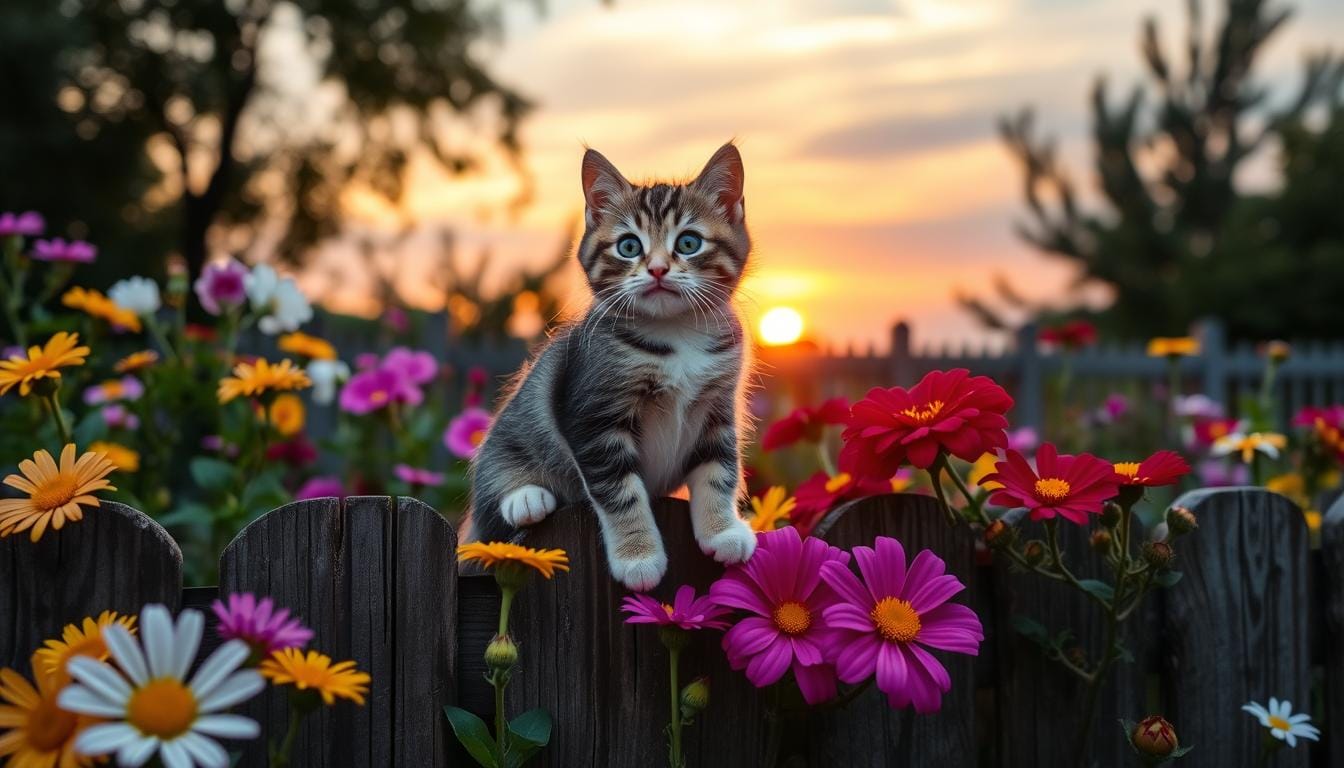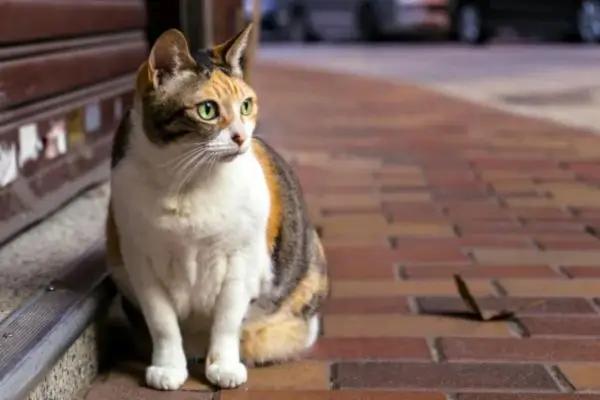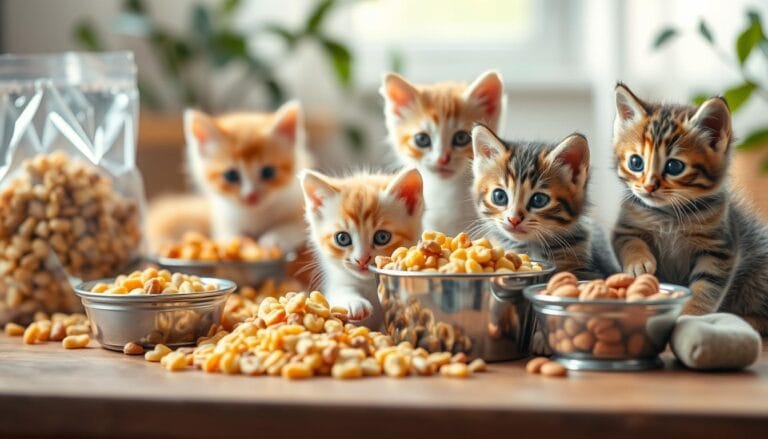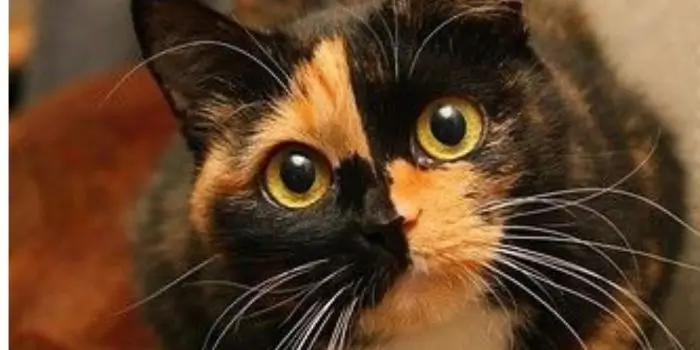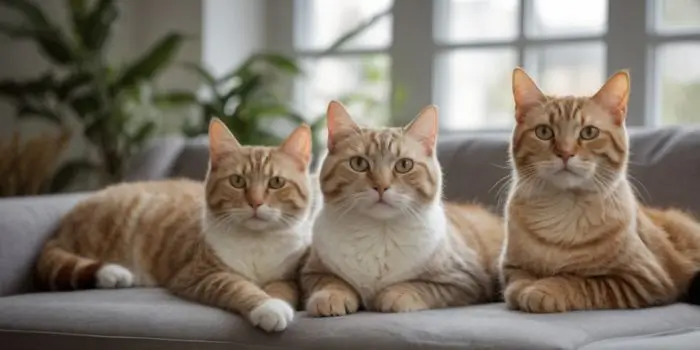Munchkin Cat Lifespan : 10 Essential Facts for Owners
As a Munchkin cat owner, knowing how long your cat will live is key. They usually live between 12 to 15 years. This can change based on their genes, what they eat, how active they are, and any health issues.
Learning about these factors helps you care for your Munchkin cat better. This guide is for both new and experienced cat owners. It covers important facts about their lifespan and how to care for them.
Key Takeaways
- Munchkin cats have an average lifespan of 12 to 15 years.
- Genetics, diet, exercise, and health conditions can influence munchkin cat lifespan.
- Regular veterinary check-ups are essential for monitoring potential health issues.
- Munchkin cats are known for their agility and playful behavior despite their short legs.
- Understanding munchkin cat average lifespan and care can help you provide the best life for your pet.
- Factors such as grooming, nutrition, and living environment also play a role in determining munchkin cat lifespan.
Understanding the Average Munchkin Cat Lifespan
Munchkin cats live about 12-15 years, similar to other domestic cats. Their lifespan can be affected by genetics, diet, and exercise. A balanced diet is key for their munchkin cat health.
Several factors can influence a Munchkin cat’s lifespan. These include:
- Genetics: Purebred cats with no genetic defects tend to live longer.
- Diet: Eating the right food is important to avoid obesity and health issues.
- Exercise: Keeping active helps prevent obesity and promotes munchkin cat health.
Knowing these factors helps owners care for their Munchkin cats better. Regular vet visits and preventive care are also vital for their munchkin cat health.
| Factor | Impact on Lifespan |
|---|---|
| Genetics | Contributes to a longer lifespan |
| Diet | Prevents obesity and health problems |
| Exercise | Prevents obesity and promotes overall health |
Genetic Makeup and Its Impact on Longevity
The genetic makeup of Munchkin cats is key to their long life. Munchkin cat genetics include a natural mutation that makes them short-legged. This mutation might also raise the risk of health problems like lordosis and osteoarthritis.
Knowing munchkin cat characteristics helps owners care for their pets better. Being aware of breed-related health issues lets owners take preventive steps. Regular vet visits and a healthy lifestyle can help manage these risks.
Important factors to think about for Munchkin cats include:
- Genetic diversity: Good breeding practices can boost genetic variety, leading to better health and longer life.
- Health issues: Munchkin cats face specific health problems like lordosis and osteoarthritis because of their genetics.
- Lifestyle factors: Keeping a healthy weight, exercising regularly, and feeding right are key for their longevity.
Understanding Munchkin cat genetics and managing health risks can help them live long, healthy lives. With the right care, Munchkin cats can be happy companions for many years.
| Factor | Impact on Longevity |
|---|---|
| Genetic diversity | Enhances vitality and overall health |
| Health issues | Increases risk of certain health problems |
| Lifestyle factors | Supports overall health and well-being |
Common Health Issues Affecting Munchkin Cats
Munchkin cats face health problems like skeletal issues, heart problems, and joint issues. Regular vet visits and a healthy lifestyle can help. Knowing these issues and taking care of your Munchkin cat is key to their health.
Some common health issues affecting Munchkin cats include:
- Skeletal conditions, such as lordosis and pectus excavatum, which can lead to mobility difficulties and respiratory problems
- Heart-related concerns, including hypertrophic cardiomyopathy and hyperthyroidism, which can increase the risk of heart disease and other complications
- Joint problems, such as osteoarthritis, which can cause pain and discomfort, affecting your cat’s activity levels and behavior
Good munchkin cat care is vital to prevent or manage these issues. A healthy diet, regular exercise, and vet visits are essential. These steps help your Munchkin cat live a long, happy life.
It’s also key to know about the genetic mutation linked to achondroplasia or chondrodysplasia. This can cause limb deformities and increase osteoarthritis risk. Understanding these issues helps you give your Munchkin cat the best care.
| Health Issue | Description | Prevention/Management |
|---|---|---|
| Skeletal Conditions | Lordosis, pectus excavatum, and other skeletal issues | Regular veterinary check-ups, maintaining a healthy weight, and providing a balanced diet |
| Heart-Related Concerns | Hypertrophic cardiomyopathy, hyperthyroidism, and other heart-related issues | Regular veterinary check-ups, maintaining a healthy weight, and providing a balanced diet |
| Joint Problems | Osteoarthritis and other joint-related issues | Regular veterinary check-ups, maintaining a healthy weight, and providing a balanced diet and regular exercise |
Nutrition Requirements for a Healthy Munchkin
A well-balanced munchkin cat diet is key for a Munchkin cat’s health and long life. Owners should give their pets high-quality cat food. This food should have protein, vitamins, and minerals.
A good munchkin cat nutrition plan stops obesity and health problems. Always have fresh water ready. Wet food boosts hydration. Choose foods with meat, poultry, or fish first, avoiding corn, wheat, and soy.
- High-quality protein sources
- Whole grains and vegetables
- Essential vitamins and minerals
With a nutritious diet, Munchkin cats can live a long, healthy life.
Exercise and Physical Activity Needs
Munchkin cats need regular munchkin cat exercise and physical activity. This keeps them healthy and long-lived. Toys, scratching posts, and other stimulation keep them active and engaged. Regular munchkin cat physical activity also helps prevent obesity and health issues.
Here are some ways to encourage munchkin cat exercise:
- Playing with feather toys or laser pointers
- Providing climbing structures and scratching posts
- Engaging in playtime with interactive toys
Munchkin cats have short legs, making them more prone to joint issues. So, it’s key to ensure they get regular munchkin cat physical activity. This keeps their joints healthy and mobile.
Regular munchkin cat exercise and physical activity help your Munchkin cat live a happy, healthy life. Always consult a vet for personalized care advice for your Munchkin cat.
| Activity | Frequency | Duration |
|---|---|---|
| Playtime with toys | 2-3 times a day | 10-15 minutes |
| Climbing and scratching | 1-2 times a day | 5-10 minutes |
| Interactive play | 1-2 times a day | 10-15 minutes |
Regular Veterinary Care and Health Monitoring
Keeping your Munchkin cat healthy is key. Regular vet visits are important. They help catch health problems early. This way, small issues don’t turn into big ones.
Vet care for Munchkin cats includes many things. This includes shots, health checks, and ways to prevent sickness. It’s all about keeping them healthy and happy.
Vaccinations are a big part of keeping Munchkin cats safe. Shots protect them from many diseases. They start getting shots when they’re young.
Health screenings are also crucial. They help find problems like lordosis early. This is important because Munchkin cats can be more prone to it.
Preventive care is also important. Here are some key things:
- Regular dental care to prevent dental disease
- Monitoring of caloric intake and weight management to prevent obesity
- Providing a balanced diet with high-quality protein
- Ensuring regular playtime and mental stimulation
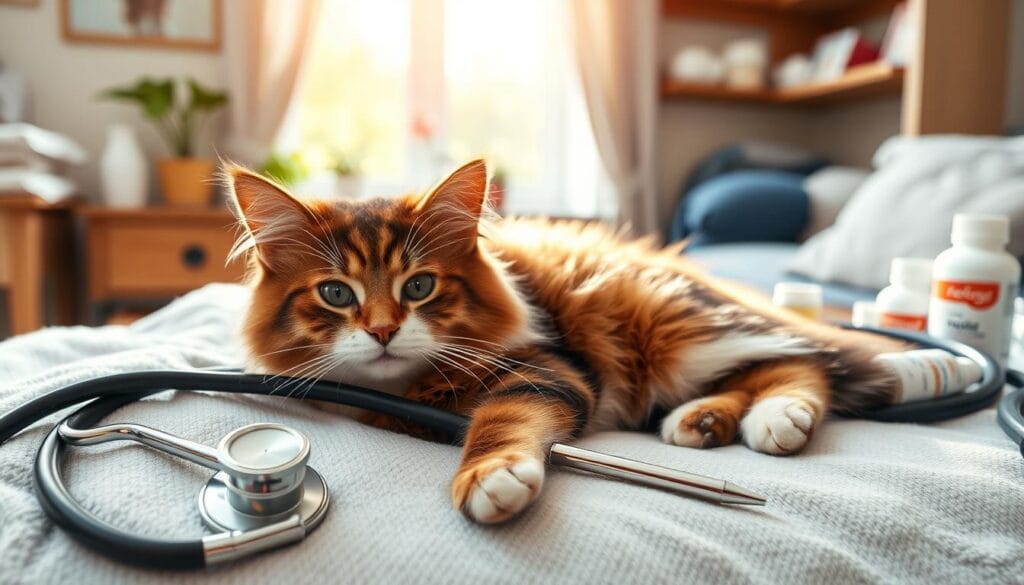
By following these tips and working with your vet, you can give your Munchkin cat the best care. Regular vet visits and health checks are vital. They help your cat live a long, happy life.
Environmental Factors and Living Conditions
The health and life span of Munchkin cats depend a lot on their living environment. It’s crucial to create a safe, comfy, and engaging munchkin cat living environment. This means keeping their space free from dangers, ensuring good air flow, and keeping the temperature right.
A well-thought-out munchkin cat living conditions can prevent health problems and ensure a long, joyful life. Important things to consider include:
- Regular exercise and playtime to keep them physically fit
- A quiet, cozy spot for rest and relaxation
- Access to fresh water and a healthy diet
By focusing on these aspects, owners can create a caring munchkin cat living environment that meets their cat’s physical and emotional needs. Regular vet visits and watching their health closely can also help catch any problems early. This way, owners can act fast and get the right treatment.
Owners can also improve their munchkin cat’s living conditions by adding mental stimulation, social interaction, and a sense of safety. This can be done by offering toys, scratching posts, and climbing structures. Spending quality time with their cat is also key.
| Factor | Importance | Recommendation |
|---|---|---|
| Exercise and Playtime | High | Provide regular playtime and exercise to maintain physical health |
| Comfort and Quiet | Medium | Create a comfortable and quiet space for rest and relaxation |
| Fresh Water and Balanced Diet | High | Ensure access to fresh water and a balanced diet |
Signs of Aging in Munchkin Cats
As Munchkin cats get older, they may show signs of aging. These include physical and behavioral changes, and special care needs. Owners should watch for these signs to give their pets the best care.
Munchkin cat senior care focuses on their physical health. They might face lordosis, pectus excavatum, and joint issues due to their body shape.
Some common signs of aging in Munchkin cats include:
- Weight gain or loss
- Changes in appetite or eating habits
- Decreased mobility or flexibility
- Increased sleeping or resting
- Changes in grooming habits or coat condition
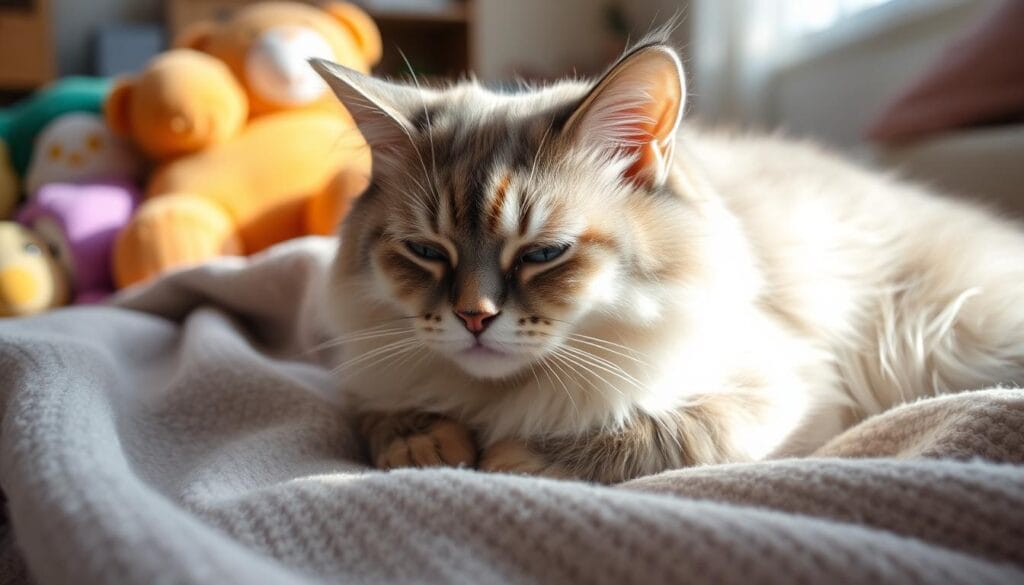
It’s crucial to work with a vet to create a care plan for your Munchkin cat. This plan may include regular check-ups, diet changes, and exercise adjustments. Proper care can help your pet stay happy and healthy in their golden years.
| Age Range | Physical Changes | Behavioral Changes |
|---|---|---|
| Kittenhood (0-1 year) | Rapid growth and development | Playful and curious |
| Adulthood (1-7 years) | Full physical maturity | Established personality and habits |
| Senior Years (7+ years) | Weight gain or loss, decreased mobility | Increased sleeping, potential cognitive decline |
Understanding aging signs in Munchkin cats and providing proper care is key. Regular vet visits, a balanced diet, and a comfortable home are essential for their senior years.
Table of Contents
Conclusion: Ensuring Your Munchkin’s Long and Happy Life
Munchkin cats are wonderful friends, living up to 12 to 15 years. To keep them happy and healthy, give them the best care. This means a good diet, lots of playtime, and regular vet visits.
By taking care of their health and making their home safe and cozy, your munchkin will thrive. With love and care, these cats can bring lots of joy for years.

